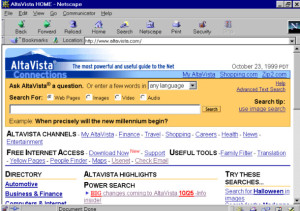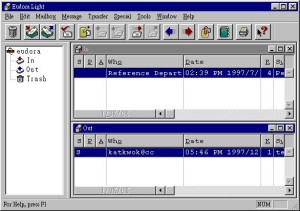An Old Story We Have to Keep in Mind
For a long time, (we could put an ending line around the year 1995) my Internet toolkit was made by Netscape Communicator (or Netscape Navigator), my search engine was Altavista and Eudora was my e-mail client (for the younger readers, they are the ones you can see in the following images).
Their setup was available on a single floppy disk and they made their work in an outstanding manner. Ok, there was not too much to do, given the kind of Internet we had at the time, but this is a whole different story 🙂
As soon as people in Microsoft realized the importance of the Internet (and of the related browser), they started pushing Internet Explorer and, with a daring move, “integrated” it in the Operating System.
The aforementioned decision (that brought to a long story of charges for anti-trust violations) meant that an Operating System with a market-share over 90% as a client O.S., came with its own Internet browsing software.
In the same period, Netscape products started performing worse and worse in Windows, new features were available only for Internet Explorer users and the “choice” of the Internet browser turned out to be a joke for many years.
A Brave New World
We have seen an astonishing number of changes during the past years, including (and not limited to):
- The raise of Google and of its ecosystem
- The rebirth of Apple and of its ecosystem
- The enormous growth in the use of smartphones and tablets with the related reduced importance of other kind of clients
- Enterprise market moving really fast to BYOD
- The downsizing of Microsoft as the main player in some IT fields
- The Cloud and mobile apps replacing more traditional solutions
Internet Explorer: an Obsolete Way to Thinking a Web Browser
Integrating the browser in the Operating System, as we said, was a win-win decision. As long as Windows was a winner, Internet Explorer was there to share the spoils.
However, the aforementioned, disruptive, changes are showing that the time is arrived to change something. The fact that the market-shares not only of Chrome (that is backed by Google) and of Safari (that uses the same win-win schema we have seen, this time with iOS) but also of Firefox are growing really fast means that Internet Explorer is doing something in the wrong manner.
Popular psychology: a user prefers to stay with something that he / she already knows. This is something that Microsoft has used a lot with Windows and Office (for example). If you use it at work, you are likely to use it at home and viceversa.
BUT Android / iOS users have no knowledge of Internet Explorer.
Just another hint: in the long list of downsides of the O.S. integration (including the fact that Internet Explorer is limited to the Windows systems), please remember that updating your Web browser means updating Windows itself, Server Operating Systems included ( WHY ? )
Internet Explorer with no Windows?
The first idea that could come to our mind is to say “Ok, take Internet Explorer and create an Android / iOS version”.
It should be not so difficult because Microsoft was able to convert a suite like Office to something that runs on the different systems.
As good as the idea may be (and “teaching an old dog new tricks” is often not a good decision), however, it could be a boomerang. If Microsoft is able to create a portable/standalone version of its browser, then the whole integration with the Operating System could be in discussion again.
My impression here, is that none in MSFT is going to risk this, after long years of discussion on this matter.
Let’s Call it Microsoft Web Browser
What Microsoft needs is a brand new Web browsing app. It should be:
- Portable on any platform
- Light and fast
- Compatible with the as many Internet standards as possible like other browsers do
- (More) opened to the addition of plugins
- Able to sync across multiple devices, so that our favorites and settings travel with us
- It should have a brand new user interface, because adapting the one from Internet Explorer will mean failure
- Should update itself as Firefox and Chrome and Safari do
Cutting the connection with the old browser has many advantages:
- No need to keep the connection with Windows
- The negative feeling related to Internet Explorer would have little impact on a brand new product
- Internet Explorer could stay as it is and continue on its path, so the risk of losing the existing market share would be low
- Wrong decisions that have accumulated over the years, could be thrown away with no remorse
- Web browser updates would have no impact on the Operating System
As I said before, it’s a brave new World. It’s difficult to win with an old idea.




